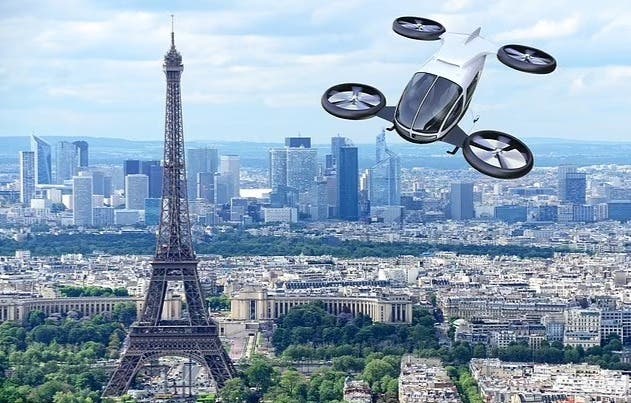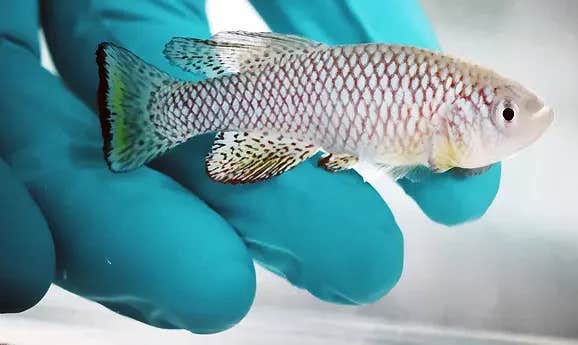The age of electric flying vehicles begins in 2024
In less than a year the world’s eyes will be set on Paris as it hosts the Summer Olympics and a startup will be carving its niche in history

[Sept 28, 2023: Staff Writer, The Brighter Side of News]
French officials have announced that Paris will begin testing electric air taxis at a test site just outside Paris. (Credit: iStock)
In exactly a year, the world's eyes will be set on Paris as it hosts the Summer Olympics. Amidst the excitement of record-breaking feats and nations battling for medals, an aviation start-up named Volocopter will be carving its niche in history.
Promising a revolutionary travel experience, Volocopter plans to launch the VoloCity, an electric vertical take-off and landing (EVTOL) aircraft, to transport passengers across Paris during the grand event.
The Emergence of EVTOL
EVTOLs have caught the fascination of tech innovators globally. These aircraft are touted as a sustainable alternative, promising quieter, more affordable, and zero-emission flights with the added advantage of landing in city centres. Numerous companies worldwide have invested in developing EVTOL technology, with Volocopter leading the charge in Europe.
Hoping to make a significant debut during the Olympics, Volocopter awaits the European aerospace regulator, EASA, to give its VoloCity the green light. Christian Bauer, Volocopter's CFO, optimistically stated, "Everything is ready and set to go for the middle of next year."
Navigating Parisian Skies
For locals and tourists alike, three pivotal routes will connect Paris's heart to its airports and heliport. Additionally, Volocopter envisions offering circular sightseeing trips. Accommodating such services in a bustling metropolis like Paris required meticulous planning for flight paths and establishing landing sites, termed vertiports.
Volocopter awaits the European aerospace regulator, EASA, to give its VoloCity the green light. (CREDIT: Volocopter)
While the aviation start-up has accomplished milestones in its 12-year journey, some argue that its most significant challenges are still on the horizon. One prominent issue is the EVTOL's battery.
While the VoloCity can cover short hops with its 22-mile range, it pales in comparison to traditional helicopters. Acknowledging this limitation, Bauer said, "What is hindering us is right now the battery technology, which all the peers are right now working on." He's hopeful about the emergence of efficient, cost-effective batteries that would allow larger EVTOL models, bringing down operational prices.
The Lilium EVTOL uses electric jets which swivel between take-off and forward flight (CREDIT: Lilium)
Volocopter isn't alone in the EVTOL arena. Another German company, Lilium, has also revealed a larger EVTOL model. Using 30 electric jets, its design is distinctly different from Volocopter's rotor-based system. Lilium CEO, Klaus Roewe, envisions a vast market for EVTOLs, especially in congested cities or places lacking proper rail infrastructure.
However, both Volocopter and Lilium bank on progressive battery technology. Experts remain divided on this front. While Roewe believes the EVTOL industry can benefit from advances made for car batteries, aerospace consultant Bjorn Fehrm counters this optimism. He indicates that EVTOLs demand a unique battery set due to the high power draw during take-off and flight.
Using 30 electric jets, Lilium's design is distinctly different from Volocopter's rotor-based system. (CREDIT: Lilium)
Darrell Swanson, another aviation expert, asserts that battery advancements are indeed accelerating, but growth for EVTOL firms is crucial. They need to upscale their production to cater to a broader demographic, not just the elite.
Manufacturing Scale and Future Prospects
Understanding the importance of scale, Volocopter inaugurated its assembly line in Bruchsal, near Stuttgart. Initially, it's geared to produce 50 aircraft annually. However, by the decade's end, they aim to manufacture between 5,000 and 7,000 aircraft each year.
Volocopter inaugurated its assembly line in Bruchsal, near Stuttgart and is geared to produce 50 aircraft annually. (CREDIT: Volocopter)
Despite the challenges, the mood at Volocopter remains optimistic. Bauer compares their journey to a marathon, saying, "I would say we are at the last step of the first marathon to certify that vehicle. So then the next marathon begins - to get to profitability."
The Paris Olympics could be the perfect launchpad for Volocopter and its groundbreaking VoloCity. As athletes prepare to push boundaries on the ground, Volocopter aims to redefine urban mobility in the skies. Only time will reveal if this aviation start-up's dream of revolutionizing urban transport becomes a reality or remains an ambitious vision.
For more science news stories check out our New Innovations section at The Brighter Side of News.
Note: Materials provided above by The Brighter Side of News. Content may be edited for style and length.
Like these kind of feel good stories? Get the Brighter Side of News' newsletter.



